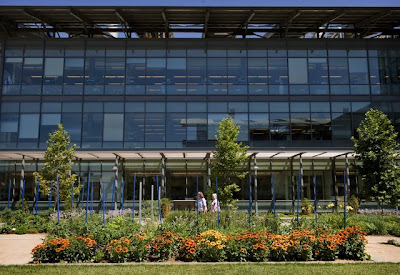







Yesterday we were fortunate enough to have a journalist from the The Sac Bee, Gina Kim, and her photographer, Autumn Cruz in our garden to cover our free herb harvest. To see the article online go here, otherwise read what Gina Kim wrote below. Also be sure to take in some of the stunning photos!
Our herb harvests are free and take place every few weeks or so during the summer and fall seasons. Be sure to keep in the loop by signing up for our newsletter, or following are Facebook and/or Twitter accounts. All the information can be found on our website.
In UC Davis courtyard, environment is edible
Leek plants reach up toward the sun. Artichokes peek out from their thistle-like leaves. Fragrant lavender blossoms dry radiantly on their stems.
It's just a routine day in the Good Life Garden at the University of California, Davis.
More than 100 types of flowers, fruits and vegetables have been planted in the 6,000-square-feet of organic growing space in the courtyard of the Robert Mondavi Institute for Wine and Food Science.
The garden is replanted three times a year – fall, spring and summer – and is an example of an edible garden used for decorative purposes.
"People haven't traditionally thought of a tomato plant or basil as landscape plants, but why not? You get something nice to look at and something to eat," said Sal Genito, director of buildings and grounds at Davis.
Those on the garden's e-mail list were invited Thursday to cut lavender and other herbs, the first of the year's monthly harvest days that run through the fall.
Andrea Thompson, 40, of Sacramento came armed with pruning shears and plastic bags. She harvested basil for pesto, garlic chives for scrambled eggs, sage for sweet potatoes and oregano for pasta sauce, plus a bunch of lavender and a bouquet of the daisy-like rudbeckia in yellow and orange.
"It's so motivational for a home gardener to see what's possible," said Thompson, operations director for the school's Foods for Health Institute.
The garden was planted in 2008, the same year the Mondavi institute opened. The second phase of the institute project, a brewery and winery, is expected to be completed this summer.
The garden costs about $45,000 a year to maintain, which Genito hopes to offset soon by selling produce to campus cafeterias as well as renting the space for private events and receptions.
Until a washing facility that complies with food safety standards is installed, most of the produce is donated to the Gunrock Pub and chancellor's events, as well as the Food Bank of Yolo County.
The plants mostly were started from seeds donated by the organic company Seeds of Change, said gardener Arlene Kennedy. Beyond weeding and pruning, Kennedy is also the one who shovels in chicken manure and compost into the beds between the year's three major plantings.
There are generally about 50 plants in the garden at any one time. The summer garden includes seven types of beans, two varieties of thyme, Armenian and lemon cucumber, 10 kinds of tomatoes, four types of eggplants, six varieties of peppers, three kinds of basil and four different lavenders.
Some of the plantings are experimental, like a Fuji apple tree that is being trained to grow like a grapevine for easier picking and space restrictions.
Two persimmon trees are being guided onto a trellis and will eventually be grafted together when they meet. And a handful of tomato plants in new varieties, such as the Pink Berkeley Tie-Dye Heart and Large Barred Boar – developed by the Suisun Valley-based Wild Boar Farms – are starting to sport their fruit.
Each of the garden's beds are a mix of flowers, fruits and vegetables, not just for the aesthetic contrast but because the varieties inadvertently help each other, Kennedy said.
For instance, Persian carpet zinnias attract hoverflies whose larvae eat aphids that feast on the snowy eggplants.
I think organic gardening is easier," Kennedy said. "I let nature resolve the problem."
LEARN MORE
• For more information about Good Life Garden or to get on the newsletter list for harvest day alerts go to www.goodlifegarden.ucdavis.edu.
• The garden is free and open to the public. Contact the Robert Mondavi Institute for Wine and Food Science, (530) 752-6741.





No comments:
Post a Comment